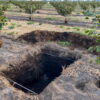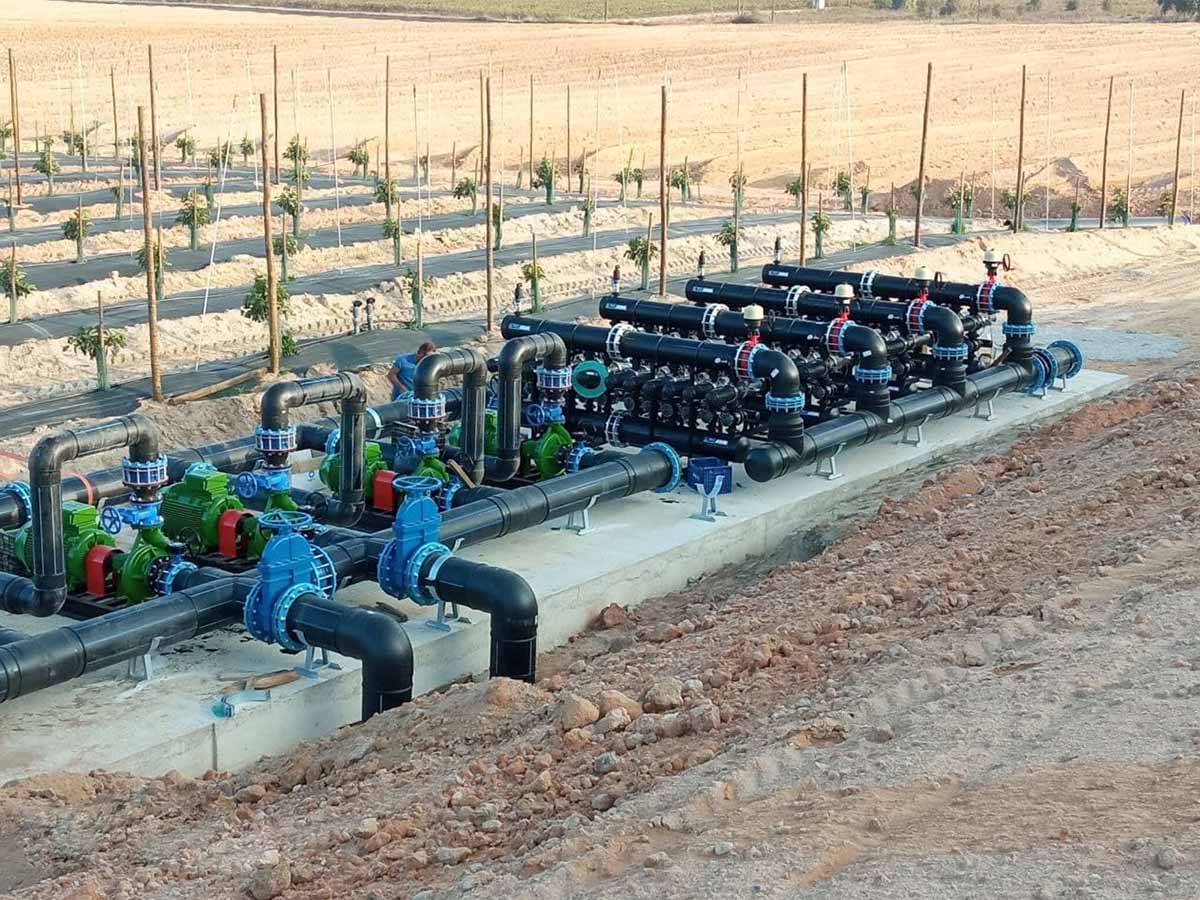Johnson tube type pipes to filter water from wells or cisterns.
The following guide explains all the aspects related to the Johnson tube, we will see the specification, the types of material, the type of well pipes, the type of well pipe, the type of well pipe, the type of well pipe, the type of well pipe.
How is Johnson type slotted tubing for water wells manufactured?
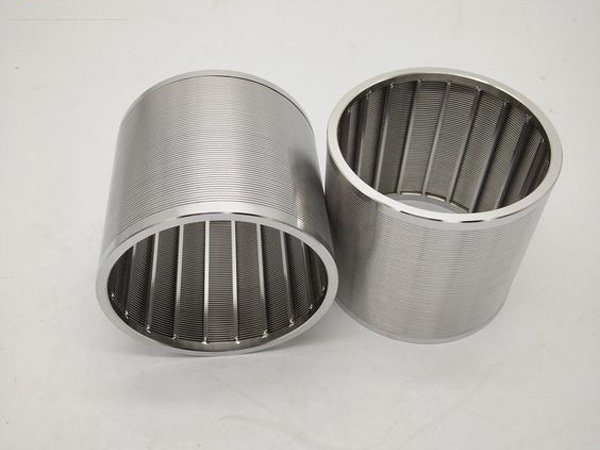
The most commonly used tube is made of continuous V-shaped stainless steel wire, normally made in a cylindrical shape around the support rods, using a specialized automatic machine that coils this wire with millimeter spacing. But, to ensure that each wire is well welded and bonded to its base, resistance welding is performed, which makes the finished tube have a firm body structure, as well as good mechanical properties, high strength, as well as load-bearing capacity. In addition, the V-shaped wire creates a groove between each gap, which narrows on the outside and opens on the inside, so that it is not clogged by particles that can get stuck and is resistant to wear and corrosion. The opening of the Johnson element varies depending on the solids retention requirements for each application.
What are the specifications of a Johnson tube?
Firstly it is by the slot size, which is the separation distance between each wire, it is customized according to customer’s requirement, the measurement is in millimeters (mm) ranging from 0.10 mm to 10 mm.
The support rod is usually made of triangular wire. Alternatives can also be round, flat or wedge rod. In addition, the material used in the manufacture of Johnson pipe can be carbon steel (we do not recommend it) or stainless steel (304 / 304L / 316 / 316L among others). The diameter typically ranges from 1″ inch to 47″ inches and the connection can be beveled, flanged or threaded.
What are the advantages of using Johnson tubing?
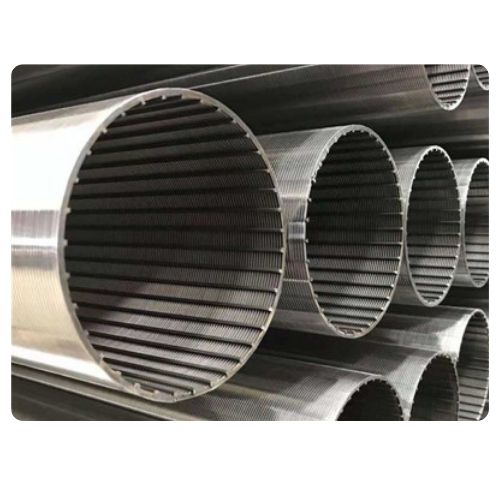
Well screens provide you with the following advantages.

- The Johnson type element of continuous rope or wire creates a V-shaped filter element that prevents clogging with small particles and therefore does not clog and has a better filtering function.
- The continuous rope and support rods are welded and this makes them more robust and therefore have a longer service life.
- They can be ordered with different openings, diameters, and types of connections as required by the customer. In addition, the longitudinal support bars and continuous grooves create a mesh with good pressure resistance performance.
What features are unique to Johnson tubing?
It is corrosion resistant. It does not clog easily. It has a large opening area. The pressure inside is greatly reduced. It has better hydraulic and mechanical efficiency.
What are the specifications of Johnson well screens?
They are manufactured from 304, 304L, 316, and 316L stainless steel. It has a diameter from 1″ or up to 47″. It also has a slot size of 0.10 mm and up to 10 mm. In addition, it has a length of up to 6 meters and a minimum open area of 14% with beveled (welded) or threaded end connection.
What are the different types of water well tubing?
They include:
1 Bridge-type slotted pipe.
This type of water filter tubes have bridge-type openings that are aligned in rows and staggered, which increases positive flow and resistance. Their slots usually protrude from a flat sheet, then beveled, resulting in a spiral bridge slot with a unique structure, with good compressive strength. It can be galvanized or use stainless steel.
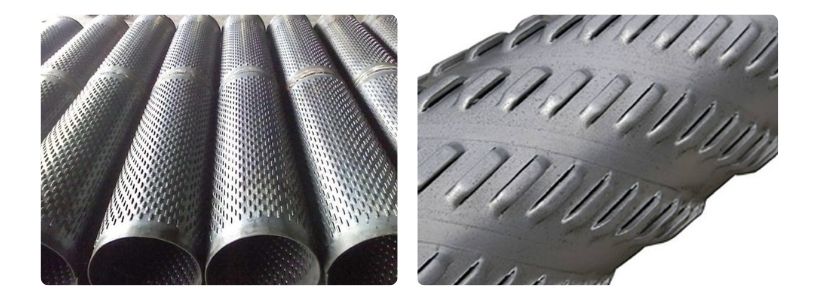
Unlike V-type continuous wire grooves, these are bridge type; particles can get stuck in the groove more easily.
It is easy to install and replace. It can be composed of different materials, which makes it adaptable to different environmental conditions. It has good strength and this is because it is resistant to torsional, compressive and tensile forces.
2 continuous wire tube.

This type of filter or screen, with the V-shaped Johnson type element, by means of a profiled wire and supporting cross rods, is the most commonly used for water wells. The wires are welded, which makes it a very strong body with good mechanical properties.
The V-shape Johnson type element, also prevents plugging, ensures a continuous water flow. In addition, this slot has more open area, which reduces the inlet velocity of pressurized water and prevents gravels or sands from passing through the screen to ensure good filtration. In addition, manufactured in stainless steel, with a diameter of between 25 and 1200 mm and a length of between 3 and 6 meters, with welded, threaded or flanged connection.

Advantages of continuous wire screen.
The large open area of the Johnson type continuous wire tube filters makes them good for making high quality water wells. It favors groundwater infiltration and decreases energy consumption. It prevents sand from entering the filter and reduces abrasion of the pumping equipment.
What are the specifications of continuous groove stainless steel Johnson well casing?
The great advantage is the V-shape of the wire and that the intersection points of the wire are fusion welded. The detailed specifications are described in the following points:
- Wedge-shaped wire having a width ranging from 1.50 mm to 4.0 mm and a height from 2.20 mm to 7.0 mm.
- Vertical support rod; width between 2.30 mm to 3.70 mm, height between 2.70 mm to 6.30 mm, and round between 5.0 mm to 6.0 mm.
- Slot size can be customized according to customer’s specification.
- Stainless steel composite material.
- The length can be up to about 6 meters which is suitable for container shipment.
- Diameter between 25mm to 1200mm.
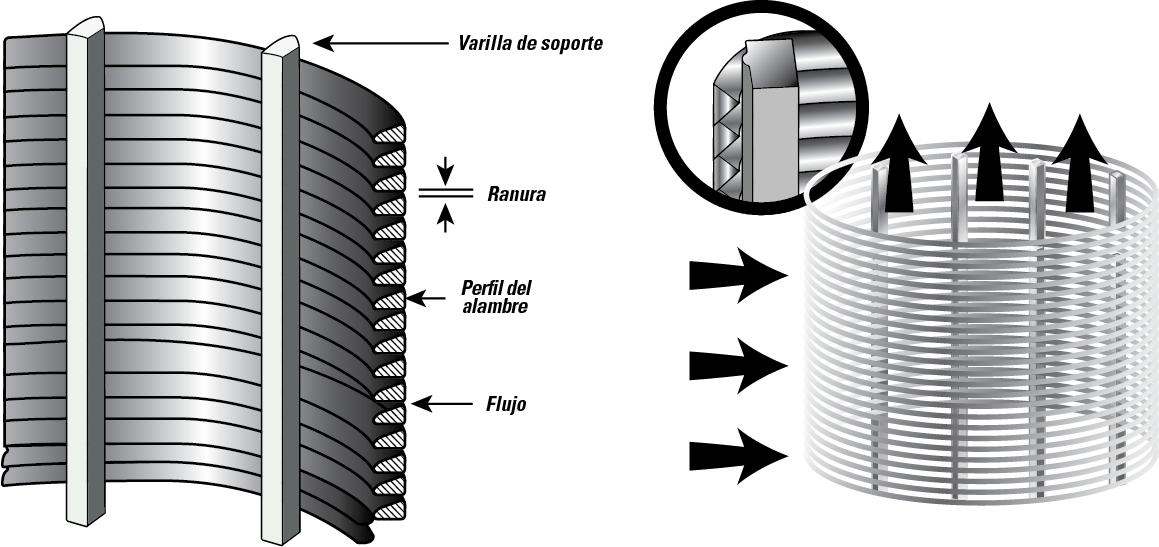
How is the quality of a Johnson pipe tested?
- The thickness of the material can be checked by the inspection method done by an ultrasonic meter.
- It can also be measured by ultrasonic flaw detection.
- The collapse test can be performed by destructive test and collapse resistance test.
- Johnson well screen casing can also be treated by pickling accompanied by passivation.
- Stainless steel can be analyzed for its chemical composition in a laboratory that performs such tests.
When should you replace a Johnson pipe?
Tubing is regularly replaced when it is severely damaged in the existing well. Therefore, a smaller diameter pipe, which is known as casing, is installed inside the original pipe and the damaged outer pipe can be replaced.
Are there specifications with quality standards for Johnson type tubing?
They include: API 5CT, ASTM A312, API 5L.
How can Johnson tubes be transported?
Johnson tubes can be packed in a poly bubble or individual bubble bag and finally in a wooden box. In addition, each box is clearly marked with the lot number, date of manufacture.
What are the specifications of Johnson pipe?
It is also known as Johnson Pipe used in water purification and is made of either stainless steel (304,304L, 316,316L) carbon steel, low carbon galvanized steel. However, the slot size ranges from 0.2mm-15mm and a diameter of 25mm -1500mm. In addition; other specifications are summarized below.
- Size in inches ranging from 4 inches to 10 inches
- Outside diameter 117 mm to 273.1 mm
- Slot size which can be customized according to customer specifications.
- Length up to 10 feet
- Collapse point 167 PSI to 395 PSI
- Wrap (thickness by depth) can be customized to customer specifications.
- Rods from 3.8 mm/22 to 3.8 mm/50
What is a continuous wire mesh?
It is a relatively short length of pipe with slots on its sides, with a specially shaped wire wrapped around it. The wire is designed to decrease the chances of sand clogging the screen, self-cleaning and reducing friction.
Advantages of the wire-wrapped screen.
- Provides a precise slot opening.
- Has the ability to rotate during installation.
- Offers high strength and corrosion resistance.
What are the characteristics of Johnson’s V-type wire mesh slotted pipe?
They include:
- Have an unobstructed surface.
- It has a large open area
- It has a low pressure drop.
- It has high hydraulic efficiency.
- Has high liquid flow rate.
- Has high mechanical efficiency
- Good abrasion resistance
- Easy to clean.
When should Johnson water pipe be used?
- When uninterrupted flow is required as the V-shaped profile prevents clogging.
- When a water well screen with an even and efficient flow is required as it has a continuous slot opening.
- When a water well screen is required with features such as backwashing, safety and reliability when in use as it has ladder welded wire screens.
How is the quality of Johnson’s stainless steel water well screens controlled?
Quality control is achieved by the following;
- Johnson well screen dimensions can be checked by a quality inspector from your supplier and this can be checked by third party inspectors or anyone available to the purchaser.
- The thickness of the wall casing material can be checked by the inspection method done by ultrasound which can also be confirmed by detection of defects through ultrasound.
The collapse test can be done by destructive testing and the collapse resistance test is done before transportation.
The production process of the product can be inspected by any inspection company acting as a third party and by any person chosen by the purchaser. Water well screens can also be placed to allow inspection prior to shipment.
What are the specific applications of Johnson type stainless steel screens for water well drilling fodder?
They are used in:
- Variety of screens with different specifications applied in wells using pumps as well as geothermal wells.
- Johnson type element or water well screens are used by food processors in the industries because they are heat resistant and anti-corrosive, which makes it easily approved by the FDA. Malting industries often find screen boards that are flat to provide good malt mixing in the rotation phase, as well as good ventilation during the drying phase.
- In the wood yard, pulp and paper need the paper machine screens, as well as during recycling, dewatering, waste disposal, fiber fractionalization, drying and water purification.
- Industries dealing with minerals, refineries, water treatment and water require Johnson type screens for water well screens.
- Oil or petroleum wells maintain a free flow of sand and gravel.
What is a screen or mesh with wedge type openings?
The metallic meshes formed by welded wires are usually made of stainless steel wire and owe their uniqueness to their chemical and corrosion resistance. This element is strengthened by its support profiles that are welded together as the wire that forms the filtering element is rotated, which makes the tube offer a high flow of liquids.
What are the advantages of wedge wire screen?
- It maximizes flow rate when compared to screens of equal length, diameter and slot size.
- It has an unobstructed slot because they have continuous slots with V-shaped openings that are narrow on the outer surface and widen inward. This, therefore, prevents large particles from entering the screen.
- It has an adjustable opening that allows different users with different equipment and filtration media to demand it and thus minimize cost.
- It is corrosion resistant and therefore reduces mesh wear.
How are V-type wire meshes specified?
V-mesh pipes are specified considering the following:

Wedge wire filter for wells
- V-type wedge wire should have a width between 1.5mm to 3.7mm and a height between 2.2mm to 7.0mm.
- The width of the support rod should be between 2.3mm to 3.7mm and a height between 2.7mm to 6.3m.
- The slot size varies from 0.1mm to 6.0mm and can be customized according to customer’s requirements.
- Material can be low carbon galvanized or stainless steel (304/304L, 316/316L among others).
- Length ranging up to 6 meters.
- Diameter ranging from 25mm to 1200mm.
- End connections can be beveled, flanged or threaded.
How do you specify Johnson V stainless steel sand control wire screen wire wedge for water well drilling?
This is specified by considering the following areas;
- It has a slot size (mm) ranging from 0.1mm to 3mm.
- It has an open area of up to 60%.
- The material can be carbon, low carbon with galvanized steel with anti-corrosion coating, or stainless steel.
- They have a unit length ranging up to 6 meters.
- They have a diameter between 25mm and 1500mm
- Their end connection can be welded or threaded coupled or flanged.
What is stainless steel continuous groove wire?
This is a continuous groove stainless steel wire wrapped by Johnson Water Well Screens which is composed of stainless steel (304,304L, 316,316L etc.) Its main feature is that it is corrosion resistant with the end connection either welded, threaded or flanged.
What size Johnson tubing should I choose for the pipe I need?
Slot size selection is an important part of ensuring maximum well performance.
Tubing is typically designed to retain particles twice its opening size, and the velocity entering the tubing should not exceed 1/10 or 0.1 foot per second. Velocity is calculated by dividing the well throughput in gpm by the open area of the filter element in square inches.
Screen slot size is based on a sample size analysis of the solid particles in the well (rocks, gravel, sand). By analyzing the sizes of the grain components in the sample, a grain size distribution curve.
Several methods can be used to obtain information about the grain size distribution. The most commonly used method consists of passing the sampled materials through a sieve.
During the sieving process, each mesh retains a certain percentage of the entire sample; the finer material is collected in the lower pan. Sieve analysis not only provides the basis for determining slot size, but also other factors that affect well design.
How to install a Johnson pipe?
Different methods are used to install these slotted pipes, although certain procedures may be more practical or more economical in certain areas.
The exact procedures to be followed when installing a well casing depend on the nature of the aquifer materials, the method used to drill the well, the dimensions of the borehole, the hydraulic conditions of the aquifer, and the casing and slotted element materials.
Where can the Johnson continuous slotted pipe be used?
It is used in: water and oil filters, oil wells, water wells, chemical industry, rainwater harvesting, cisterns…
What is a Johnson Screen Wedge Wire Screen Tubing?
These are produced using a V-shaped or wedge-shaped wire internally surrounded by support bars. The wedge-shaped profile wraps around the entire length of the screen, resulting in a continuous slotted opening for the free flow of water or oil. Therefore, during flow, most of the gravel and sand is retained in the Johnson-type element of the pipe.
What are the characteristics of Johnson pipe?
The material is composed of carbon steel or stainless steel. It has a slot size from 0.5 mm and can be customized according to the needs of the well. It has a unit length of up to 6 meters, but can be coupled to more pipes to lengthen the water catchment area. It has an open area of at least 14%. The end connection can be a welded or threaded or flanged end cap. The surface can be treated by galvanizing, epoxy painting, polishing, pickling and passivation, etc.
What are the applications of the Johnson filter tube?
They are used in: Oil/water filter, Oil wells, Water wells, Chemical plants.

What are the advantages of the Johnson tube filter?
- It has a good resistance in its construction.
- Greater hydraulic capacity.
- Higher well performance.
- It has a longer useful life.
- Less pumping of sand and other solids.
- No clogging
- Has a large filtration area
- Its connections and specifications can be customized according to the specifications of the application.
Are there any specific applications for the Johnson type pipe?
Yes, it is used in the following areas: water cleaning, pond cleaning, cisterns, surface water collection free of coarse particles.
What are the characteristics of Johnson type 316L fine cord tubing?
1) It consists of a welded stainless steel screen, composed of cross rods.
2) These rods can be of round, triangular or trapezoidal wire.
3) The rope forming the Johnson type element is made of triangular wire (V-shaped wire).
4) They have a high open structure and filtering area, with precise slot dimension.
5) Besides, it is heat-resistant, corrosion-free, longer lasting, safe and reliable. Therefore, it can be used in many medium filtering areas.
Johnson type well casing
Are there disadvantages to Johnson slotted screens for wells?
Yes, if not properly maintained, it can be costly.
If you have further questions about their performance or special cases about Johnson well screens, please contact us!
Distributor of central pipe and laterals.
This system is used in pressure tanks for water filtration, it is a distributor that makes that each lateral is connected to a head or central tube, which makes that in a tank the water flow down the filtering bed in a uniform way and is collected by the lateral arms. This generates a more efficient filtration.
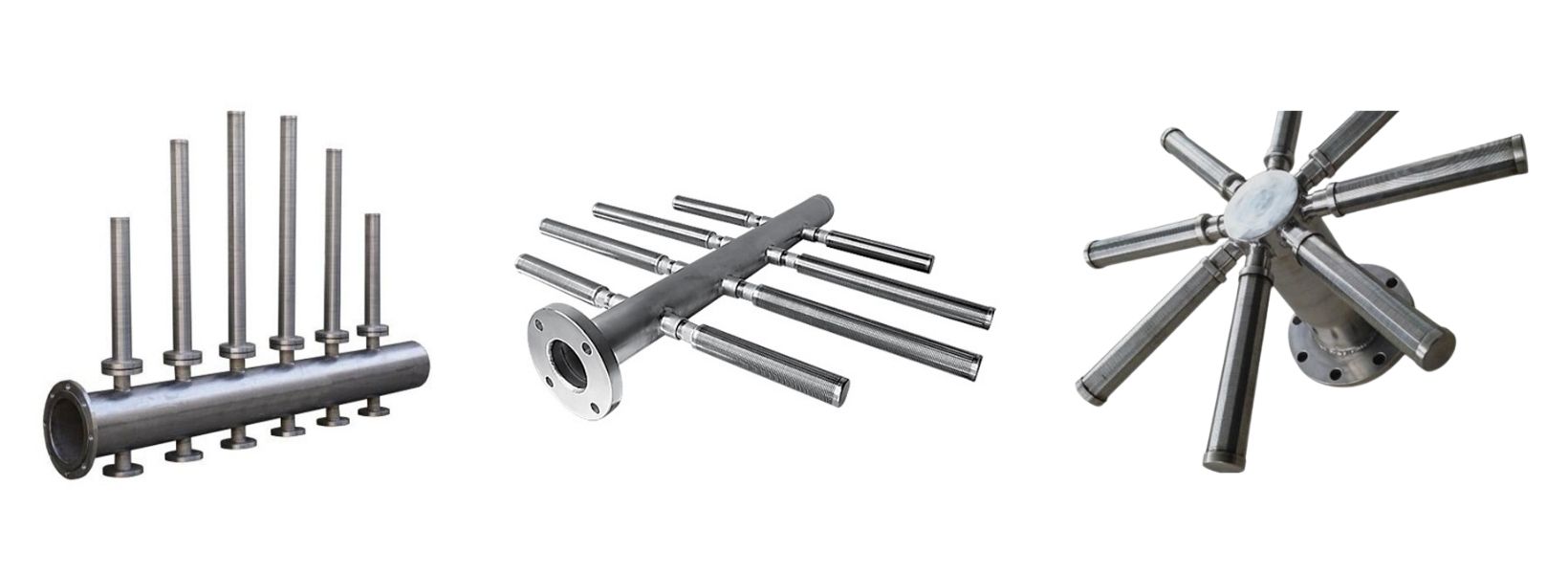
Center head distributor
This allows a uniform flow inside the industrial water filter, and prevents the granular media from loading on one side of the tank or creating a cone. In addition, this manifold can be connected directly to the side and collect the treated water flow, this modification should be made prior to tank construction. Or they can also be designed to allow for center, top and bottom inlet piping.
The backwash system can also be adapted to this manifold to allow for fast and efficient cleaning. It is made of stainless steel up to 1″ wide and up to 20 feet long. Its slot size and other specifications can be customized according to your specifications.



